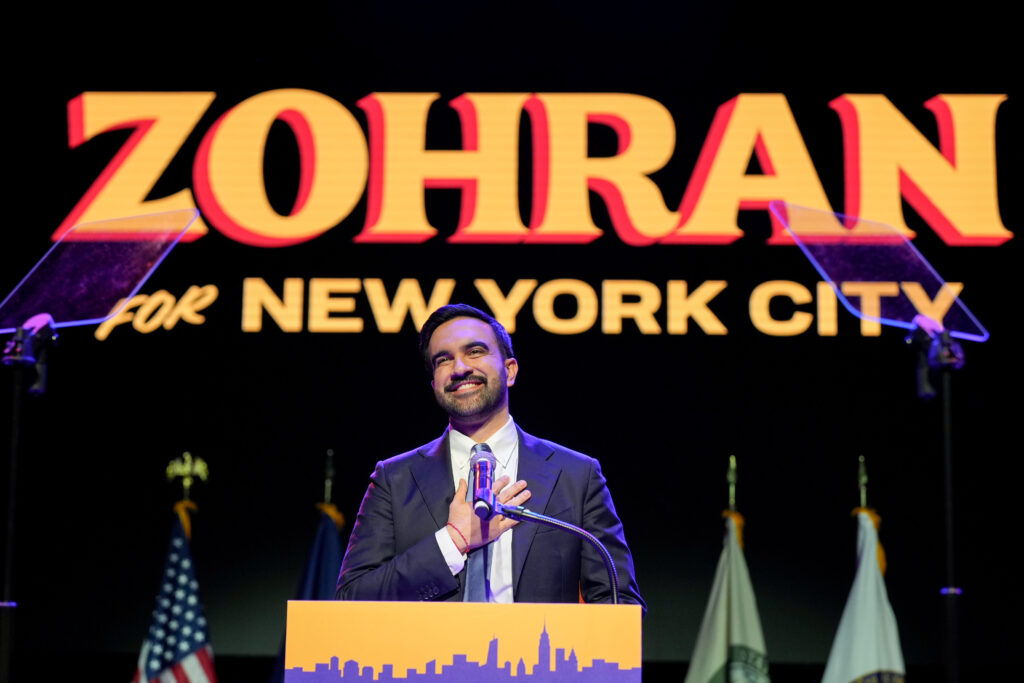New York Correspondences / Political and Geostrategic Observatory of the United States
5 November 2025
Mamdani’s Election: Catalyst of an Already Well-Advanced Cold Civil War

It’s done. On Tuesday evening, against the hopes of the establishment but in line with the polls, Zohran Mamdani won New York’s mayoral election, clearly defeating Andrew Cuomo and Curtis Sliwa.
At 34, this member of the Democratic Socialists of America—who has pledged to freeze rents and tax the rich—has become the most left-wing mayor in the city’s history, and perhaps in the entire United States.
Throughout the evening, television screens displayed the dismayed faces of commentators on CNN and MSNBC. Their shock was genuine: for the media establishment as for the political elite, this victory remains incomprehensible. How could the world’s financial capital—Wall Street, the temple of American capitalism—elect an avowed socialist?
The answer can be summed up in one word: collapse. The collapse of the old-school Democratic Party, unable to offer anything other than a pathetic recycling of personal ambitions and backroom deals.
The Eric Adams affair will go down in history as a textbook case of political betrayal. The outgoing mayor, mired in corruption scandals, first tried his luck as an independent candidate after giving up on running against Mamdani in the Democratic primary he knew he would lose.
For months, he had vilified Andrew Cuomo with remarkable violence—calling him a “snake,” a “pathological liar,” a “finished man”—before withdrawing last Thursday to endorse him. The deal was clear: Donald Trump had reportedly promised him a position in exchange for his support of Cuomo to block “the communist.” Adams, who faces multiple corruption charges in federal court, jumped at the opportunity.
As for Cuomo, the former governor forced to resign after accusations of sexual harassment, he perfectly embodies that generation of politicians for whom democratic rules matter only when they serve their interests. Having sworn to support “whoever won” the Democratic primary, he quickly ran as an independent after losing to Mamdani (56% to 44%). His campaign, partially financed by Republican donors, failed to mobilise beyond an ageing conservative electorate.
On the Republican side, Curtis Sliwa’s candidacy—he already lost in 2021—was sheer farce. His stubborn refusal to withdraw, despite pleas from his own party, split the anti-Mamdani vote and mathematically ensured the “socialist’s” victory.
This triumph stems from a massive rejection of the establishment. Zohran Mamdani won not only thanks to the so-called “Brooklyn bobos,” as his critics claim, but also thanks to working-class voters from Queens, the Bronx and Harlem.
These New Yorkers have had enough of cynicism, broken promises and endless scandals. In the face of the establishment’s moral bankruptcy, the Mamdani vote appeared as a democratic rupture.
Less than an hour after the results were announced, a close ally of Donald Trump declared: “New York has chosen communist chaos. They’ll get it. But they won’t impose it on the rest of the country.”
Later that evening, the tone reportedly escalated further. Statements attributed to the 47th President of the United States suggested that, in his view, deploying the National Guard was becoming almost inevitable “to prevent New York from turning into a new Venezuela.”
The threat is not rhetorical. Trump has already deployed troops to Los Angeles, Washington, Portland and Chicago over the summer. Each time, the pretext was “national security” or “law and order.” Each time, the real aim was to intimidate Democratic strongholds deemed too progressive.
For his part, the newly elected mayor is standing firm. He has just reaffirmed his most controversial positions. He will honour the International Criminal Court’s arrest warrant against Benjamin Netanyahu if the latter sets foot in New York. He will turn the city into a “total non-cooperation zone” with ICE, Trump’s immigration police. New York will become an “absolute sanctuary city” for undocumented migrants.
“Donald Trump can threaten all he wants,” he declared. “New York will not submit. This city was built by immigrants, by workers, by ordinary people. We will not let anyone—not even the President—dictate who we are.”
The rhetoric is powerful. The reality will be harsh. Zohran Mamdani will have to govern a city whose budget partly depends on federal subsidies that Trump can cut overnight. He will have to deal with a municipal bureaucracy still filled with Adams loyalists, face a largely hostile national press, and confront a New York business establishment that views him with suspicion, if not fear.
This mayoral election reaches far beyond New York’s borders. It crystallises the confrontation between two irreconcilable visions of America. On one side, progressive metropolises seeking to embrace a European-style social democracy—with greater redistribution, public services and social protection. On the other, an authoritarian federal power that perceives these aspirations as an existential threat to be crushed by any means necessary—including military ones.
Will Donald Trump carry out his threats and deploy the National Guard in New York once Mamdani takes office—or even before? Will Mamdani manage to govern in the face of a hostile federal authority that still controls part of the purse strings?
New York has just elected its most left-wing mayor. The United States is entering a new phase of its cold civil war—now fought in the open, on home soil.
Romuald Sciora is Director of the Political and Geostrategic Observatory of the United States at IRIS, where he is an Associate Research Fellow. A Franco-American essayist and political scientist, he is the author of numerous books, articles and documentaries and is a regular commentator on international affairs in global media. He lives in New York.

